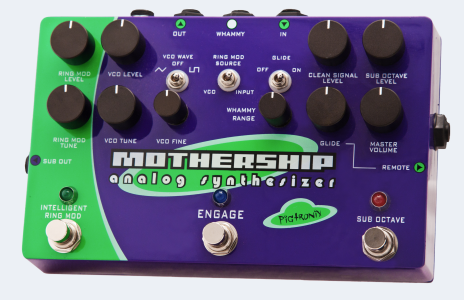NAMM 2013: Pigtronix Posts Demo Video for MotherShip Analog Guitar Synthesizer

Fresh off last week's NAMM Show, Pigtronix has posted this new demo video of its MotherShip Analog Guitar Synthesizer. It features guitarist Carl Roa.
The Mothership features VCO, Sub-Octave and Intelligent Ring Modulator. Incredibly fast tracking and ultra FAT tone make this unique synthesizer ideal for use with guitar, bass, horns, vocals or any other musical instrument. No special pickup or interface is required.
[[ Keep up with Guitar World's NAMM 2013 coverage right here! ]]
At the heart of the Mothership is a note-recognition system that achieves instantaneous and accurate pitch to voltage translation. The Mothership is a true analog monosynth with a limitless array of tuning options between its voices covering eight octaves
VCO — the main voice of the Pigtronix Mothership — is a VCO (voltage controlled oscillator) that outputs either triangle or square waves. An adjustable portamento (glide) effect can be added to produce subtle slides from note to note or outrageous multi-octave glissando maneuvers. An expression pedal jack for Whammy control provides tunable pitch bending up to one octave using a TRS Expression pedal. That’s right … ANALOG WHAMMY!
For more information on the pedal, head to pigtronix.com. For more about Roa, visit carlroa.com.
Get The Pick Newsletter
All the latest guitar news, interviews, lessons, reviews, deals and more, direct to your inbox!
Since 1980, Guitar World has been the ultimate resource for guitarists. Whether you want to learn the techniques employed by your guitar heroes, read about their latest projects or simply need to know which guitar is the right one to buy, Guitar World is the place to look.
“Jimi was staying at a hotel in Times Square. He had his hair set in pink curlers and we would just talk band drama”: Electro-Harmonix founder Mike Matthews on befriending Hendrix, booking Chuck Berry and the birth of pedal culture
“Our answer to everything players have asked for and more”: Neural DSP’s Nano Cortex had one major drawback – but now it’s been addressed with a huge free firmware update that takes on Kemper and TONEX











